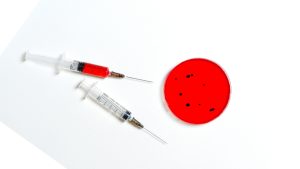
Photo Credits: Anna Shvets, https://www.pexels.com/photo/syringes-and-petri-dish-on-white-background-3786122/
Researchers from the NUS Yong Loo Lin School of Medicine (NUS Medicine) have shown that gene therapy using a single-dose injection of a virus carrying the ‘good’ gene can potentially be used to cure growth-hormone resistant dwarfism, also known as ‘Laron Syndrome’.
People with Laron syndrome are very short as their bodies are unable to use the growth hormone, a substance that helps the body to grow. The team led by Prof Lee K O, from Department of Medicine at NUS Medicine, attempted to increase a hormone called insulin-like-growth factor 1 (IGF1) in a laboratory model by replacing the defective growth hormone receptor gene, using a virus containing instructions specifically targeted at the liver. The liver is the main organ producing the IGF1 hormone.
Previously, the only treatment available was injection of genetically-engineered recombinant insulin-like-growth factor 1 (rhIGF1), administered daily or even twice daily. Yet, the results from this original treatment have not been ideal.
The team previously generated a specific gene delivery tool, called the AAV8 carrier that expressed the human insulin gene in the liver. When this showed potential to be used by diabetic patients as a long-term basal insulin gene therapy, the team of researchers which included Dr Sia Kian Chuan and Dr Gan Shu Uin, from the Department of Surgery, attempted to further explore the potential of the AAV8 gene delivery tool to understand the extent of its efficacy.
The results showed the significant size and weight which increased steadily throughout the course of 26 weeks, in comparison to the untreated laboratory model. Other researchers have shown that there is persistent gene expression for up to 10 years to produce proteins in the liver necessary for growth, following a single dose of AAV administration.
This makes AAV gene therapy an attractive treatment with potentially significantly good therapy outcomes.
Read more in the press release here.

